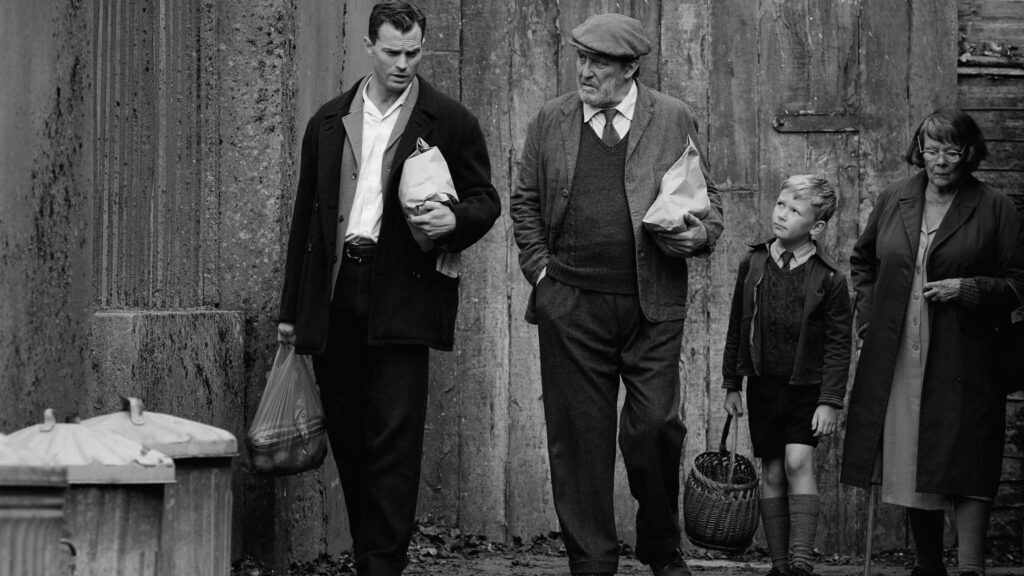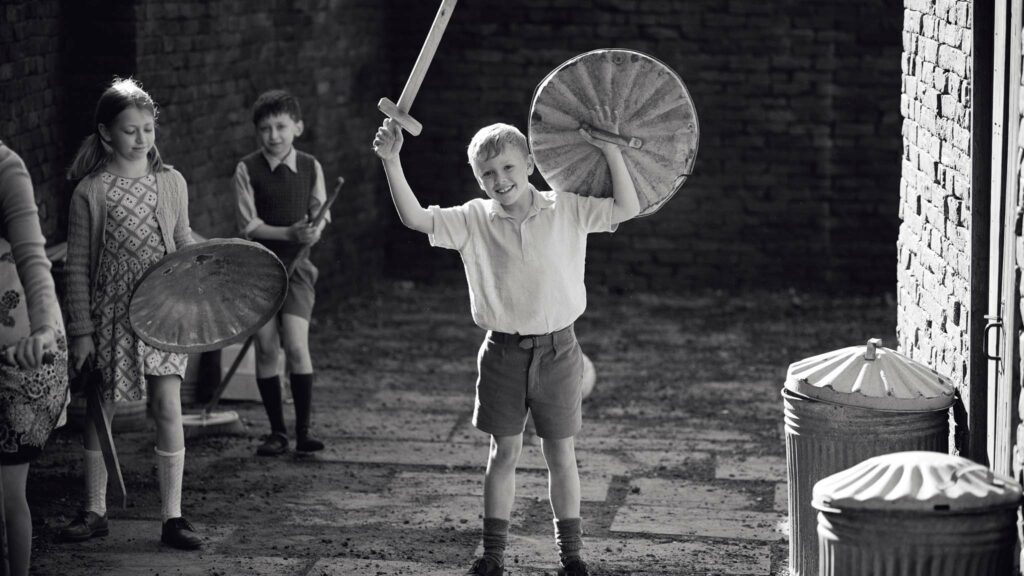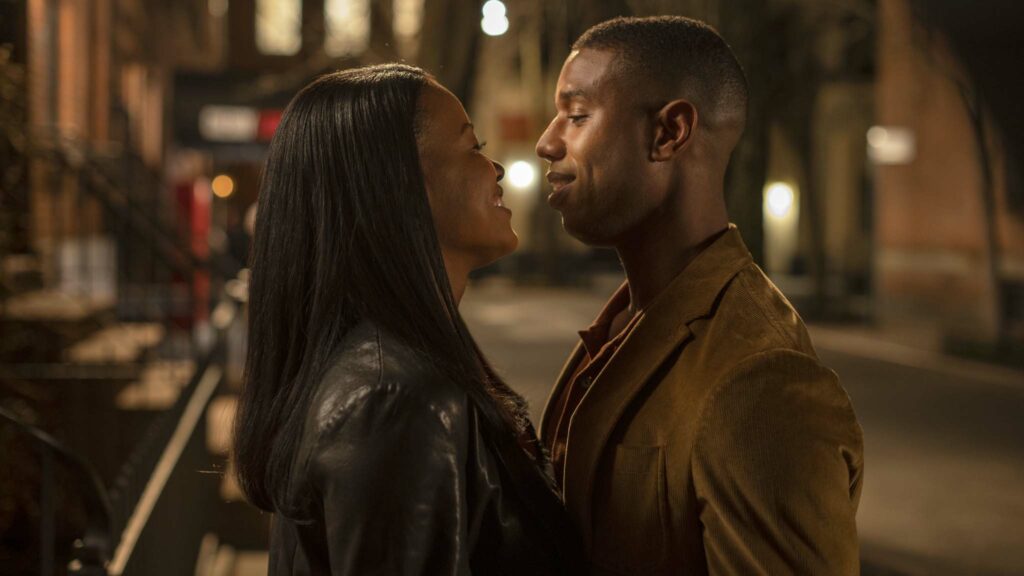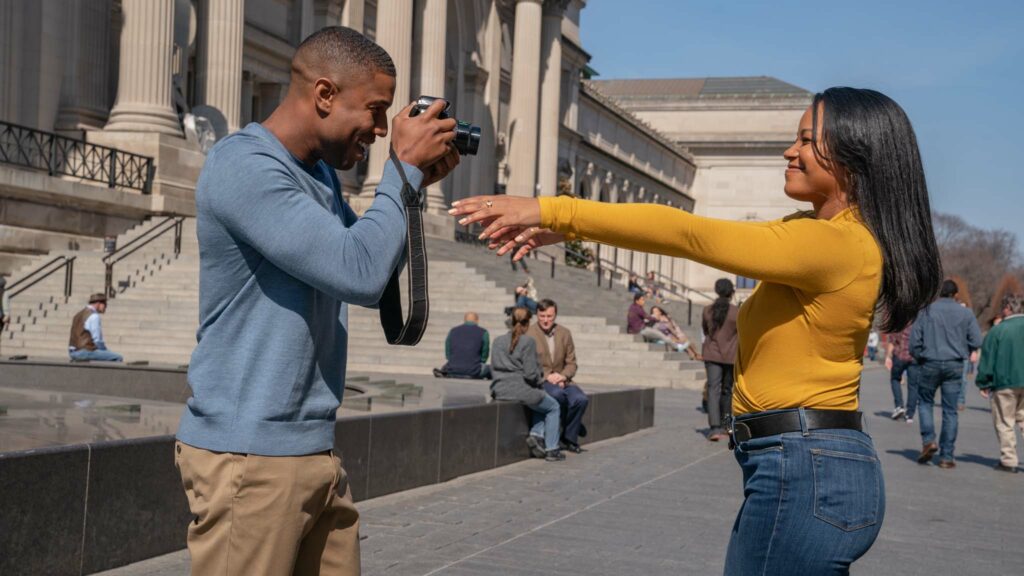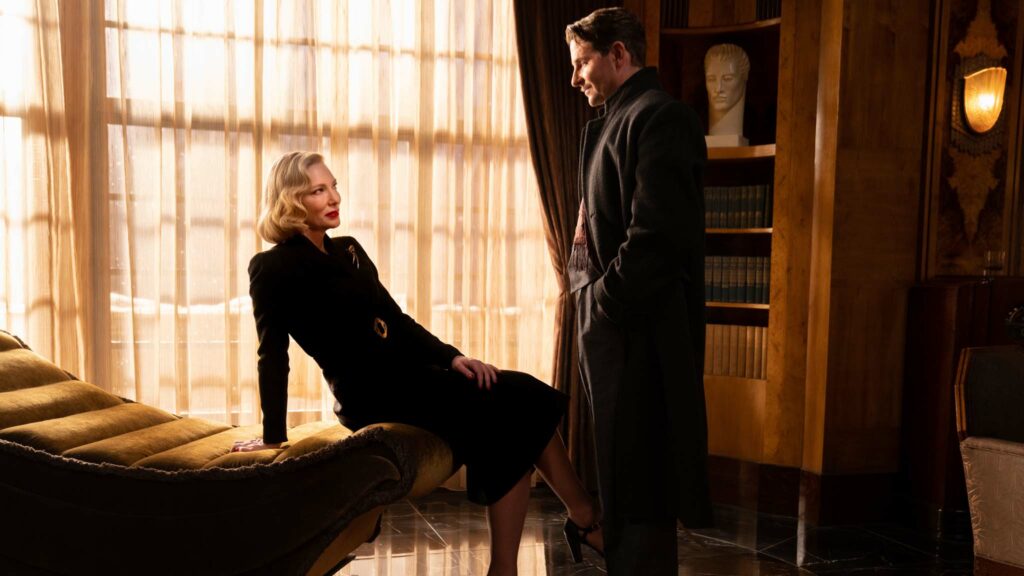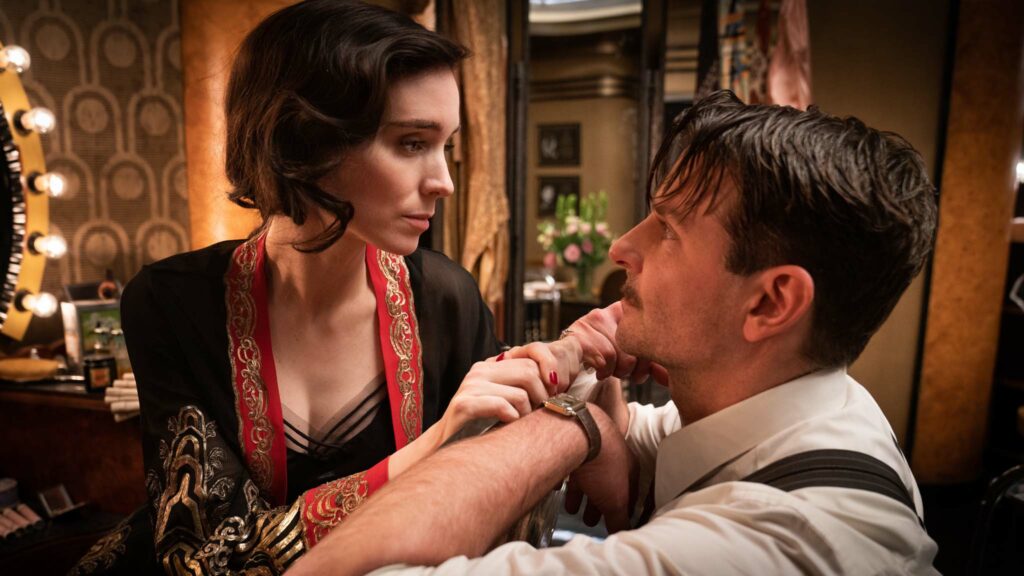Drama
Belfast (12A)
Review: Life in black and white seems more colourful and vibrant in writer-director Kenneth Branagh’s wondrous coming-of-age drama, drawn from the film-maker’s vast well of childhood experiences in 1960s Belfast. Sincerely dedicated to the people of the Northern Irish capital – “For the ones who stayed. For the ones who left. And for all the ones who were lost” – Branagh’s most personal film unfolds from the perspective of a nine-year-old rapscallion called Buddy (played by luminous newcomer Jude Hill), who we first see romping around the streets with his pals, brandishing a home-made wooden sword and using an upturned dustbin lid as a shield.
The cheeky tyke is slaying imaginary dragons but the invisible enemy, which is poised to roar and tear apart Protestant and Catholic communities, is a two-headed hydra of political and nationalistic fervour. Principal characters in Branagh’s script are referred to simply by their familial ties to Buddy – Ma, Pa, Granny and Pop – tapping into an undercurrent of charming childhood innocence that insulates the boy from the harsh reality of barricades being hastily erected at the end of the street or a local supermarket being looted during a riot.
Indeed, when the prospect of leaving Belfast for good solidifies, Buddy is most troubled about leaving behind his school crush, a girl called Catherine, who repeatedly scores top marks in teacher Miss Lewis’s tests of the children’s times tables. The simple arithmetic of Branagh’s crowd-pleasing film adds up to a beautifully crafted valentine to a city in the grip of devastating change and a resilient and warm-hearted people, who mine humour in adversity. “The Irish were born for leaving,” an aunt tells Buddy’s mother by way of a bittersweet farewell. “Otherwise the rest of the world would have no pubs!”
Buddy (Hill) and his family – Pa (Jamie Dornan), Ma (Caitiona Balfe) and older brother Will (Lewis McAskie) – live in a predominantly Protestant district of north Belfast, cheek by jowl with Catholic neighbours. Granny (Dame Judi Dench) and Pop (Ciaran Hinds) live a few streets away. Billy Clanton (Colin Morgan) and his comrades target Catholic houses in Buddy’s neighbourhood, claiming they are “lookin’ to cleanse the community a wee bit”. Hostilities result in family members going through barricade checkpoints and local men patrolling night-time streets with torches. For Pa, it is an unthinkable opportunity to transplant the clan to Australia or Canada: “An escape route”.
Distinguished by Haris Zambarloukos’s monochrome cinematography, Belfast relies on a terrific ensemble cast led by the exuberant Hill to paper over slight narrative shortfalls in a rose-tinted script drizzled with nostalgia. Balfe’s fearful matriarch is the film’s beating heart and she powerfully conveys the emotional turmoil of a family’s forcible displacement from their home. Branagh’s delicate touch results in a sprightly running time that leaves us hankering for more.
Find Belfast in the cinemas
Romance
A Journal For Jordan (12A)
Review: In the misery-soaked opening section of Guillermo del Toro’s noir thriller, adapted by the Oscar-winning Mexican director and Kim Morgan from William Lindsay Gresham’s 1946 novel, a booze-sodden, retired mentalist warns the slippery anti-hero to steer clear of clairvoyance. “No good comes out of a spook show,” he blathers, hungover. His lamentable warning falls on deaf ears, on screen and off.
The charlatan protagonist falsely communes with the dead to exploit paying customers’ grief and del Toro tethers a starry cast, including Bradley Cooper, Cate Blanchett, Toni Collette and Willem Dafoe, to a tawdry tale of duplicity and avarice that runs dry of tension before the tangled plot enters its third languid hour.
This Nightmare Alley doesn’t have to jump through censorship hoops like the 1947 film version headlining Tyrone Power as the seedy carnival worker destined for an almighty fall from grace. Here, a teasing glimpse of full-frontal male nudity in a steaming bathtub and some suggestive soaping secure a 15 certificate almost as much as spurts of stomach-churning violence including an inglorious end for a live fowl and a human skull crushed in queasy close-up.
Fantastical, otherworldly elements, a signature of del Toro’s earlier work including Pan’s Labyrinth and The Shape Of Water, are all smoke and mirrors and the con feels like it may be on us to muster concern for underwritten doomed characters as that headless chicken comes home to roost. Cooper lacks menace and is, to quote Collette’s bogus medium, simply “easy on the eyes, honey”. Thankfully, Blanchett slinks delectably through the second half as a femme fatale psychologist, who has accumulated enough personal secrets about her clientele to keep herself in velvet capes until the soft lighting dims.
Stanton Carlisle (Cooper) joins a carnival run by Clem Hoatley (Dafoe) and learns tricks of the trade from fading double act Zeena and Pete Krumbein (Collette, David Strathairn). The newcomer beguiles naive showgirl Molly Cahill (Rooney Mara) and the lovebirds run away from Clem, and the protection of strong man Bruno (Ron Perlman), to establish themselves as a speciality act at the Copacabana club in Buffalo, New York. A diabolical deception involving Dr Lilith Ritter (Blanchett) and her former patient, powerful industrialist Ezra Grindle (Richard Jenkins), is a swindle too far for Stanton. “If your foot slips, we both fall,” Lilith sternly reminds the chancer.
Nightmare Alley seduces the eyes with glorious production and costume design but the heart goes a-wanting, despite simmering sexual tension between Cooper and Blanchett (“I know you’re no good. I know that because neither am I!”) Pacing is pedestrian and only shifts out of first gear in a breathless closing act that serves its just desserts chilled and with a grimace.
Find A Journal For Jordan in the cinemas
Thriller
Nightmare Alley (15)
Review: A moving true story of service and sacrifice during a highly contentious war is sweetened by Oscar-winning actor Denzel Washington as he nestles back into a director’s chair for the first time since Fences in 2016. Adapted by Virgil Williams from Dana Canedy’s celebrated memoir, A Journal For Jordan takes its title from the notebook that US Army First Sergeant Charles Monroe King kept for his infant son while serving in Iraq before he died on October 14 2006 when an improvised explosive device detonated under his Humvee.
“I want you to know that it’s okay for boys to cry,” he wrote on one of 200 pages of anecdotes, life lessons and fatherly advice including strongly worded guidance on treating women with respect. The fractured chronology of Washington’s heart-tugging film over a 20-year period hampers dramatic momentum while Williams’ script paints King as a shy, sensitive and artistic saint.
Michael B Jordan loses more than his shirt to add gym-toned physical perfection to the soldier’s enviable qualities. Chante Adams exudes sass as a Pulitzer Prize-winning journalist with a nose for a good story but when it comes to candidly discussing with her son the reasons for a war that destroyed their family unit, she is uncharacteristically prosaic. “Some say it was to stop the terrorists over there. Some say we made them terrorists in the first place. But your dad would say he was fighting for his men.” Some would say that is sanitised screenwriting.
In 1998, Dana Canedy (Adams) is a journalist on The New York Times with a strong aversion to romantic commitment, catalysed by painful memories of her retired drill sergeant father (Robert Wisdom) cheating on her mother (Tamara Tunie). “Men are luxuries, not necessities,” chirrups Dana to her coterie of close friends comprising co-worker Miriam (Susan Pourfar), Ciro (Grey Henson) and Robin (Vanessa Aspillaga).
Her deeply ingrained hostility towards men in military uniform mellows when she meets Charles (Jordan), a veteran of Operation Desert Storm, who trained under her father. Dana falls for Charles’s old-fashioned charm and falls pregnant before he is deployed to Iraq. She gives her fiance a journal to pen words of wisdom to their boy. “Tell him who you are, what you believe in and tell him that you love him, just so he knows,” she coos, blissfully unaware that Jordan will grow up without a father from the age of six months.
A Journal For Jordan wears its heart on its sleeve next to King’s numerous medals and polished patriotism. Aside from one sequence in September 2001, on-screen captions help us navigate the shifting timeframes with minimum confusion and equal parts emotional engagement. On-screen chemistry between Adams and Jordan perpetually fizzes when the script around them feels like it’s going flat.
Find Nightmare Alley in the cinemas


